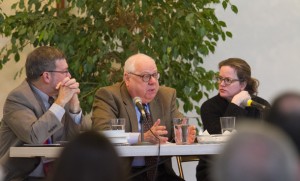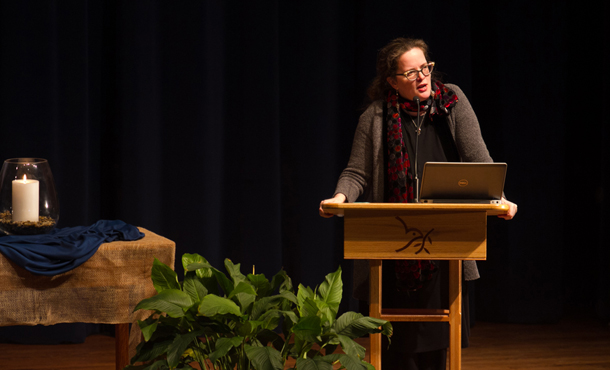Author, scholar and Episcopal priest Lauren Winner opened the annual School for Leadership Training at Eastern Mennonite Seminary with succinct advice for those seeking to understand the changing dynamics affecting the 21st century American church.
“It might be good news for your church to get smaller,” said the Duke Divinity School professor. “That is, if the people who are there are really curious about Jesus.”
Approximately 250 participants, including church leaders, seminary alumni and students, converged on the Harrisonburg campus Jan. 19-21 to explore the concept of “nones,” those 46 million Americans who identify themselves as agnostic or atheist or who simply claim no affiliation with organized religious denominations.
Winner reminded the participants that Jesus was not there when the women went to the tomb after he had been crucified and died.

“Jesus has risen and moved on,” she said. “One task for the church today is to ask where the resurrected Jesus is and to get our bodies to that place.” She encouraged participants to think about what would be missing from their communities and the world if the church just stopped.
Using the metaphor of fire to describe the things a church does well, Winner asked, “Where is the fire in your church? No one church has fire everywhere. If there is not fire for something, stop doing it.”
Winner’s comments on “naming our fear, bringing it to light, and allowing it to be transformed” were especially meaningful to church planter Chris Scott, of Winchester, Virginia. “I also appreciated that she named that basically my job is to talk about God a lot.”
“I appreciated the push toward continuing to clarify the gospel of Jesus in the context of the community and world,” said Duane Beck, pastor of Raleigh Mennonite Church in Raleigh, North Carolina. “How is the gospel transformational for us? It is out of that transformation that we experience and express who Jesus is more clearly.”
Winner also participated in a panel discussion with EMU Provost Fred Kniss and Daniel Aleshire, president of the Association of Theological Schools, which dug deeper into the statistics and sociological research of the current religious landscape in the United States.
With more than 35 years in theological education, Aleshire brings a unique perspective to the discussion about cultural shifts. Since 1998, he has headed an organization that oversees accreditation of more than 270 graduate schools of theology, representing a wide range of denominations, in the United States and Canada.
He reminded participants that religious participation in the United States is the highest of any liberal democracy in the world. It is significantly higher than any other western nation. However, for the first time, Protestant denominations are less than the majority of the U.S. population. The majority of those now claiming no religion are white, and formerly identifying as evangelical and mainline Protestants.
Aleshire, who holds an MDiv from The Southern Baptist Theological Seminary and a PhD in psychology from Vanderbilt’s George Peabody College, also pointed out that there is a rising number of single people, either never married, married and divorced, or widowed, in the U.S. “How much of church life is based on family?” Aleshire asked. “It is important that we attend to the life space of people over time.”
In addition to keynote speeches and plenary and panel sessions, morning and afternoon workshops provided insight into ministry across age ranges, generational differences, and spiritual leanings.
Jeff Carr, pastor at Bridgewater Church of the Brethren in Bridgewater, Virginia, attended a panel discussion of “nones,” one of whom made a particularly memorable comment that Carr says he won’t soon forget. “The person asked, ‘Why doesn’t the church spend time working to create a good space for those who actually want to be there, instead of spending all its time and energy trying to get those outside the church in?’”
Emily Hedrick, a self-proclaimed “actual millennial” who studies at Wake Forest Divinity School, was appreciative of SLT’s thematic focus. “It was great to get affirmation that people do care about us,” she said. “They want to ask questions. It’s important for millennials to learn our own role and that it is possible to be helpful [in addressing this issue]. Conversations across age groups are good and helpful and necessary.”
Hedrick, a graduate of Goshen College, recently published the allegorical novel Confessions of a God Killer, part of which was penned while working at the famous Iona Abbey in Scotland.
SLT participants came from a variety of denominations, backgrounds and generations, and ample opportunity for fellowship and networking occurred during breaks and over meals.
The theme of change dominated the discussion. “God and the Spirit are dynamic, always moving,” said Kniss. “But the church is afraid of change.”
SLT gave participants permission to identify and name their fear, to learn about the changing landscape of religion in the United States, and to reflect theologically on what that means for churches and congregations.
To download worship resources or order a DVD of this event, visit emu.edu/slt.
